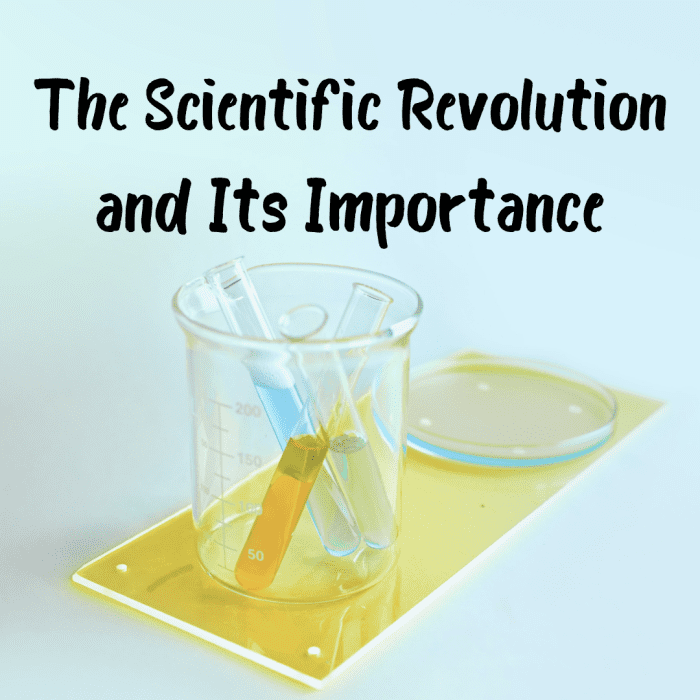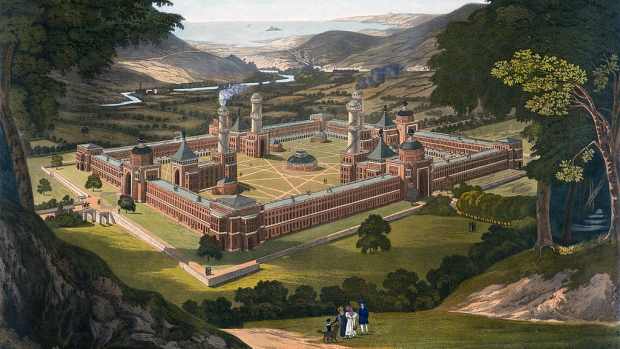The Scientific Revolution: An Event Which Changed the World

This article covers the Scientific Revolution, discussing its causes, major events, and overall importance. Read on to learn more!
What Was the Scientific Revolution?
It was 1666 in England. The Bubonic plague was everywhere. Students were sent home to avoid the epidemic. On a summer day, a bright young man who studied at the University of Cambridge was sitting under a tree in a garden in Lincolnshire County, England.
Suddenly, he saw an apple drop. A question flashed through his mind: Why does everything move downward rather than sideways or upwards? He later found the answer to his question in the Law of Universal Gravitation, which he discovered. He also established the three laws of motion and infinitesimal calculus. He was Sir Isaac Newton.
His notes, which he entitled the Quaestiones Quaedam Philosophicae ("Certain Philosophical Questions"), reveal that he had discovered a new idea of nature that provided a framework for the Scientific Revolution. He inspired the people of his times to question everything around them.
What they discovered might seem like standard reality to us, but people of those times had very fixed beliefs. Much of their knowledge came from religious books and churches, and they thought that they completely understood the world. However, this certainty was changed forever by the Scientific Revolution.
Like Newton, many scientists in those times discovered and invented much of what is the foundation of modern knowledge. Now, you might have a few questions about all of this. This article answers the following questions that are often raised about the Scientific Revolution and its impact on the world:
- What is the Scientific Revolution?
- When did the Scientific Revolution take place?
- What was the condition of people before the Scientific Revolution?
- What were the causes of the Scientific Revolution?
- What are the significant discoveries and inventions of the Scientific Revolution?
- How and in what ways has the Scientific Revolution affected the lives of people?
- How did the Scientific Revolution change the world and people's outlook forever?
Definition of the Scientific Revolution
According to the Oxford Dictionary, the word scientific means "connected with science, and the word Revolution means a complete change in methods, opinions, etc., often resulting from progress." So, we might define the term scientific revolution as "a complete change in methods, opinions, etc., often resulting from progress in science."
Moreover, it refers to the remarkable growth of human power and ingenuity over the last 500 years, much of which results from the discoveries and inventions of modern science. Many world-changing discoveries and inventions occurred during the Scientific Revolution and laid the foundations for science's progressive achievements.
The Beginning and End of the Scientific Revolution
The Scientific Revolution began in 1543, toward the end of the Renaissance period, with the publication of the book On the Revolutions of the Heavenly Spheres, which was written by Nicolaus Copernicus. It ended in 1687 with the publication of the book Principia: The Mathematical Principles of Natural Philosophy, authored by Sir Isaac Newton.
Where Did the Scientific Revolution Happen?
It happened primarily in Europe but had measurable effects on people from numerous other countries and changed many aspects of their life.

Unsure of the importance of the Scientific Revolution? Let's take a look at what the world was like before it took place ...
What Was the World Like Before the Scientific Revolution?
In the year 1500,
- The human population was hovering around 500 million. The total value of goods and services produced by humans at this time is an estimated $250 billion. Humanity consumed approximately 13 trillion calories each day. The annual per capita income averaged $550. Only a few cities in the world had over 100,000 inhabitants.
- No human had circumnavigated the earth. Ferdinand Magellan would first accomplish this in 1522.
- No one had yet seen a microorganism. The first microorganism ever seen was in 1674 by Antonie van Leeuwenhoek.
What Were Housing Conditions Like?
- People used primarily wood, mud, and straw to make buildings. Adobe was also used, which is a type of sun-baked brick made from sand, gravel, and/or clay.
- Only candles and torches were available to illuminate the darkness at night. The cityscape was nearly pitch black.
Recommended
From these few facts already mentioned, it should be clear that people's lifestyles were much more limited than they are today. Much of this improvement and expansion of individual lifestyles is due to the efforts of modern science.
What Was Education Like?
- Authorities like Catholic Church officials and ancient Greek writers guided most educated people at those times. This means that ancient texts and traditions were the basis of educated people's thoughts and beliefs.
- Until the early modern period, kings and emperors gave money to education and scholarship to preserve existing qualities, not acquire new ones.
- Traditions formulated theories in terms of stories and not mathematics.
What Did People Think About Science?
- Premodern traditions of knowledge such as Islam, Christianity, Buddhism, and Confucianism asserted alternatively that the great gods, the one almighty God, or wise people of the past possessed all-encompassing wisdom, which was revealed to them in scriptures and oral traditions.
- It was unimaginable that their religious books, such as the Bible, the Quran, and the Vedas, were missing out on things that humans could discover.
These points reveal that people had misunderstandings about the possible progress of knowledge and understanding. Their beliefs were the issue blocking their way to new discoveries and illuminating inventions.
The important physicist James Clerk Maxwell stated that "Thoroughly conscious ignorance is the prelude to every real advance in science." This means that acknowledging our lack of understanding gives us a reason to learn. If a person thinks that he or she knows everything, then they will stop trying to conceive of new ideas or possibilities because there is no need.
What Were the Causes of the Scientific Revolution?
- Admitting ignorance: The root cause that launched the revolution was the admittance of ignorance. European scholars acknowledged that their theories were not perfect. There were necessary things that they did not know. For example, Europeans realized the insufficiency of medieval experimental methods. So, they felt the need to devise new approaches (some of which we use today).
- Thinking scientifically: Europeans had values, myths, judicial apparatuses, and socio-political structures. They thought and behaved scientifically before enjoying technological advantages.
- Ambition to explore, conquer and learn: Europeans had an unparalleled and insatiable ambition to explore and conquer. At the end of the fifteenth century, Europe became a hothouse of important military, political, economic, and cultural developments. Consequently, they had access to information possessed by other countries. They also believed that acquiring knowledge is always good. This access and belief enabled them to learn more. For example, Europeans had access to the endowment of Greek, European, and Middle Eastern scientific philosophy. They used these philosophies as a starting point for disproving or building theorems.
- Proper financing in scientific research: Scientific research can prosper only in association with some ideology or religion. So, at the time of the revolution, the purpose of funding scientific studies was to attain some political, economic, or religious goals. These goals consisted of helping emperors and army officers to win wars, govern well, get good health care, etc. Political and economic institutions provided resources to achieve these goals. In return, scientific research provided powers to obtain new resources, some of which were invested in research again. This loop between science, empire, and capital fueled the revolution. For example, in the sixteenth century, kings funded geographical expeditions to gain information that would help them conquer new countries and set up new empires.
- The centrality of mathematics: An alliance between members of mathematical communities with seventeenth-century scientists, philosophers, and astronomers increased the usage of mathematical tools to connect observations into comprehensive theories.
- Publication of works: Many institutions helped to authenticate science as a field by providing outlets for publishing scientific works. One of those institutions was the British Royal Society. It inspired more scientists and simplified the spread of knowledge.
Significant Discoveries and Inventions During the Scientific Revolution
This is a short list briefly covering some of the most important discoveries and inventions during the Scientific Revolution.
Astronomy
- Nicolaus Copernicus propounded the heliocentric theory in 1543. In this theory, he positioned the sun near the center of the universe, motionless, with Earth and other planets rotating around it in circular paths with uniform speeds. This theory needed a few corrections. Those corrections were made by the scientists Tycho Brahe, Johannes Kepler, and Galileo Galilei.
- Johannes Kepler discovered two planetary laws of motion in 1609. He stated the third planetary law of motion in 1618.
- Galileo Galilei designed his telescope and made several important astronomical discoveries like the phases of Venus, the moon’s surface, the four largest moons of Jupiter, and the rings of Saturn. He also made detailed observations of sunspots.
- Isaac Newton developed ties between astronomy and physics through his Law of Universal Gravitation.
Physics
- Mechanics
- Archimedes developed the foundations for a new physics that was highly mathematizable. He discovered the law of free fall and derived the parabolic path of projectile motion.
- Christiaan Huygens formulated the laws of conservation of momentum and kinetic energy (valid only for elastic collisions).
- Sir Isaac Newton developed the concept of force, the law of universal gravitation, the three laws of motion. His physics led to the conclusion that the shape of the earth is not precisely spherical but bulged at the equator. Using this fact, he showed how the axis of rotation would change its direction.
2. Optics
- Rene Descartes derived the laws of reflection and refraction using mechanical analogies. He also explained the double refraction phenomenon.
- Newton demonstrated that white light is a mixture of separate beams of coloured light and explained the way prisms produce spectra of colours from white light.
3. Electricity
- Dr. William Gilbert discovered that many substances other than amber, sulphur, etc., manifested electrical properties.
- Robert Boyle stated that the electric attraction and repulsion acting across a vacuum would attract light substances, indicating that the electrical effect did not depend on air as a medium.
- Otto von Guericke invented an early electrostatic generator.


